

Andragogy: what is it and does it help thinking about adult learning? Contents: introduction · some general issues with Knowles’ approach · the assumptions explored · andragogy and pedagogy · andragogy – the continuing debate · further reading and references · how to cite this article.
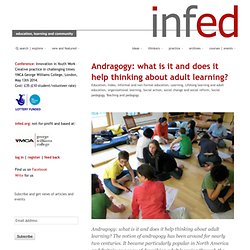
See, also: malcolm knowles, informal adult education, self-direction and andragogy The term andragogy was originally formulated by a German teacher, Alexander Kapp, in 1833 (Nottingham Andragogy Group 1983: v). He used it to describe elements of Plato’s education theory. Andragogy (andr- meaning ‘man’) could be contrasted with pedagogy (paid- meaning ‘child’ and agogos meaning ‘leading’) (see Davenport 1993: 114). Kapp’s use of andragogy had some currency but it was disputed, and fell into disuse. In the minds of many around the adult education field, andragogy and the name of Malcolm Knowles have become inextricably linked. Dan Pink: The puzzle of motivation. 21st Century Skills. Explore these powerful tools to help reach your goals.
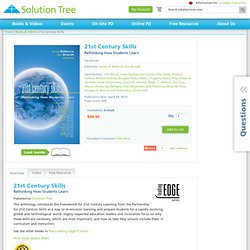
21st Century Skills: Rethinking How Students Learn. Www.comp.dit.ie/dgordon/courses/ilt/ilt0004/thetwosigmaproblem.pdf. What is Heutagogy? Education 3.0 and the Pedagogy (Andragogy, Heutagogy) of Mobile Learning. The evolution of the web from Web 1.0 to Web 2.0 and now to Web 3.0 can be used a metaphor of how education should also be evolving, as a movement based on the evolution from Education 1.0 to Education 3.0.
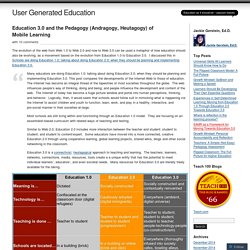
I discussed this in Schools are doing Education 1.0; talking about doing Education 2.0; when they should be planning and implementing Education 3.0. Many educators are doing Education 1.0; talking about doing Education 2.0; when they should be planning and implementing Education 3.0. This post compares the developments of the Internet-Web to those of education. The Internet has become an integral thread of the tapestries of most societies throughout the globe.
The web influences people’s way of thinking, doing and being; and people influence the development and content of the web. Source: This translates into moving from an education approach driven by essentialism or instructivism to one that is based on constructivism and connectivism. Teach Less Learn More : THE "SHIFT" IN EDUCATION. Nov November 16, 2012 | 2 Comments What a dilemma.
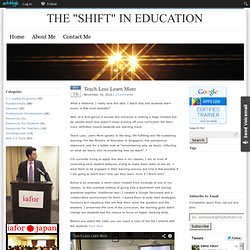
I really love this idea. I teach less and students learn more, is that even possible? Well, at a first glance it sounds like someone is making a huge mistake but be careful teach less doesn’t mean pruning off your curriculum but learn more definitely means students are learning more. Teach Less, Learn More speaks to life-long, life-fulfilling and life-sustaining learning. I’m currently trying to apply this idea in my classes. Below is an example, a short video created from excerpts of one of my classes. Before you watch the video you can reach a copy of the file I shared with the students from here. When I look at this classroom I see collaborative interactions.
National Institute of Education (NIE), Singapore. Outcome is a mixed bag as some children are still being pressured to do well in exams SINGAPORE - When the call to "teach less, learn more" was first made in 2004, parents and teachers alike were excited about the prospect of a less pressurised education system.
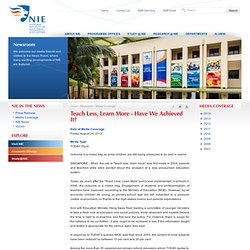
Today, six years after the "Teach Less Learn More" policy was implemented in schools in 2006, the outcome is a mixed bag: Engagement of students and professionalism of teachers have improved, according to the Ministry of Education (MOE). However, by all accounts, children as young as primary-school age are still subjected to a pressure cooker environment, no thanks to the high-stakes exams and parents' expectations.
And with Education Minister Heng Swee Keat leading a committee of younger ministers to take a fresh look at education and social policies, some observers and experts believe the time is right to re-examine and fine-tune the policy. The benefits cited included the reduction of didactic instruction in the classroom. National Institute of Education (NIE), Singapore. Advancing the Theory and Practice of Self-Determined Learning. Heutagogy Community of Practice. “Heutagogy is the study of self-determined learning … It is also an attempt to challenge some ideas about teaching and learning that still prevail in teacher centred learning and the need for, as Bill Ford (1997) eloquently puts it ‘knowledge sharing’ rather than ‘knowledge hoarding’.
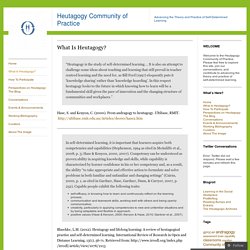
In this respect heutagogy looks to the future in which knowing how to learn will be a fundamental skill given the pace of innovation and the changing structure of communities and workplaces.” Hase, S. and Kenyon, C. (2000). From andragogy to heutagogy. Ultibase, RMIT. In self-determined learning, it is important that learners acquire both competencies and capabilities (Stephenson, 1994 as cited in McAuliffe et al., 2008, p. 3; Hase & Kenyon, 2000, 2007).
Content Curation And The Future Of Search: The Future of Search. Rives: The Museum of Four in the Morning. Sugata Mitra: Build a School in the Cloud.